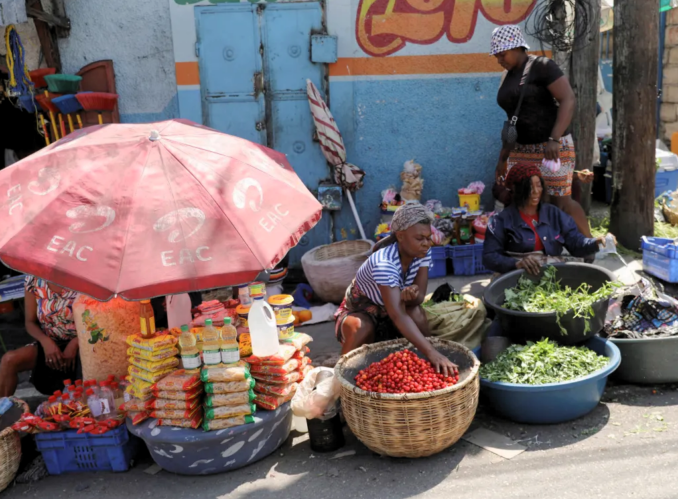How the United States pretends to help Haiti

Street vendors at Port-au-Prince market, February 2024.
Twenty-one years after British King George III recognized the independence of the United States in 1783, the Haitian revolutionaries declared independence and abolished slavery on Jan. 1, 1804. First they had to smash Napoleon’s army, which the French ruler had sent to re-colonize the country.
The government in the United States, where slavery was legal and extremely profitable in 1804, ignored this change in Haiti’s status until 1862.
Before the U.S. Civil War, there were several immigration movements that encouraged free people of African descent living in the northern states to emigrate to Haiti. By some estimates, about 20 percent of that group went to Haiti for at least some time. These movements forged enduring links between the people in the U.S. and Haiti.
In 1815 Simón Bolívar, South America’s revolutionary hero, was forced to flee Venezuela for Jamaica after Spain’s royal forces destroyed New Granada. The Haitian government gave Bolívar asylum, troops, arms and money in return for his promise to abolish slavery when his movement won independence.
In the early 20th century, Washington’s pretext for sending Marines into Haiti was the alleged need to restore order there and to maintain political and economic stability in the Caribbean. During this U.S. occupation of Haiti, which lasted from 1915 to 1934, the United States got Philippe Sudré Dartiguenave, a pro-U.S. politician, elected president.
From 1957 until 1986, Washington backed the rule of the Duvaliers, father and son, based on the Duvaliers’ opposition to “Cuban communism” and the need to maintain public order in Haiti. The fists and enforcers of the Duvaliers were armed groups called “Tonton Macoutes” (Kreyol for “bogeymen”) and the armed groups that opposed them were often called “vigilance brigades.”
Questionable elections
In 2011, international donors spent $18 million to organize elections in Haiti. Following many disputes over the vote count, the Electoral Council report on the first round of voting found former first lady of Haiti Mirlande Manigat in first place and Jude Célestin finishing second, which should have meant the two would face off in the decisive second round.
A report by the Organization of American States — the OAS is a creation and tool of U.S. imperialism — found that popular singer Michel “Sweet Micky” Martelly had placed second. Secretary of State Hillary Clinton made a one-day trip to Haiti Jan. 28, 2011, and told the Electoral Council to place Martelly second. Martelly won the run-off against Manigat. Martelly’s party, PHTK (Haitian Tèt Kale Party) also placed Jovenel Moïse, who was assassinated three years ago, and Ariel Henry into the presidency in elections since 2011.
Jean-Bertrand Aristide was twice elected president of Haiti and twice forced from office by coups.
In 1991 the army officers led by Raoul Cédras that overthrew Aristide felt that they had the backing of the United States, because the U.S. was willing to bargain with them. The U.S. did support and participate in the multinational operation to restore Aristide but only after much of his term had expired.
According to the book, “Aid State,” by Jake Johnston, it was the U.S. State Department — not the CIA — that organized the 2004 coup that ousted Aristide. Jude Philippe was the main Haitian organizer. Philippe later was indicted and convicted by the U.S. for laundering drug money. He spent six years in a U.S. federal prison before being deported back to Haiti.
The United States, France and the United Nations have a bad reputation among Haitians. The armed groups that the U.N. and the corporate media throughout the world call Haitian “gangs” are either criminal enterprises engaged in kidnapping, extortion, robbery and drug dealing, or “vigilance brigades” that defend neighborhoods against the gangs and the police.
Despite the support from these vigilance brigades, hundreds of thousands of Haitian families have been driven from their homes by the violence between the armed groups and the cops.
Five million of Haiti’s 12 million people go hungry every day. One million face famine, dying because they don’t get enough calories.
When de facto Prime Minister Ariel Henry visited Africa to gather support for his regime, the various armed groups suddenly joined together at the end of February and demanded he resign.
CARICOM— the organization of Caribbean nations — called an emergency meeting of a presidential council to find a replacement for Henry. The council is still accepting nominations, as of March 17. Ambassadors of the U.S., Canada, the European Union and the U.N. are meeting in Jamaica with the Caribbean countries signing on via Zoom.
The political situation in Haiti is fluid. Major changes can occur overnight. Given most Haitians’ anger toward prior U.S. and U.N. interventions, any future direct role for them in Haiti will be challenged.

